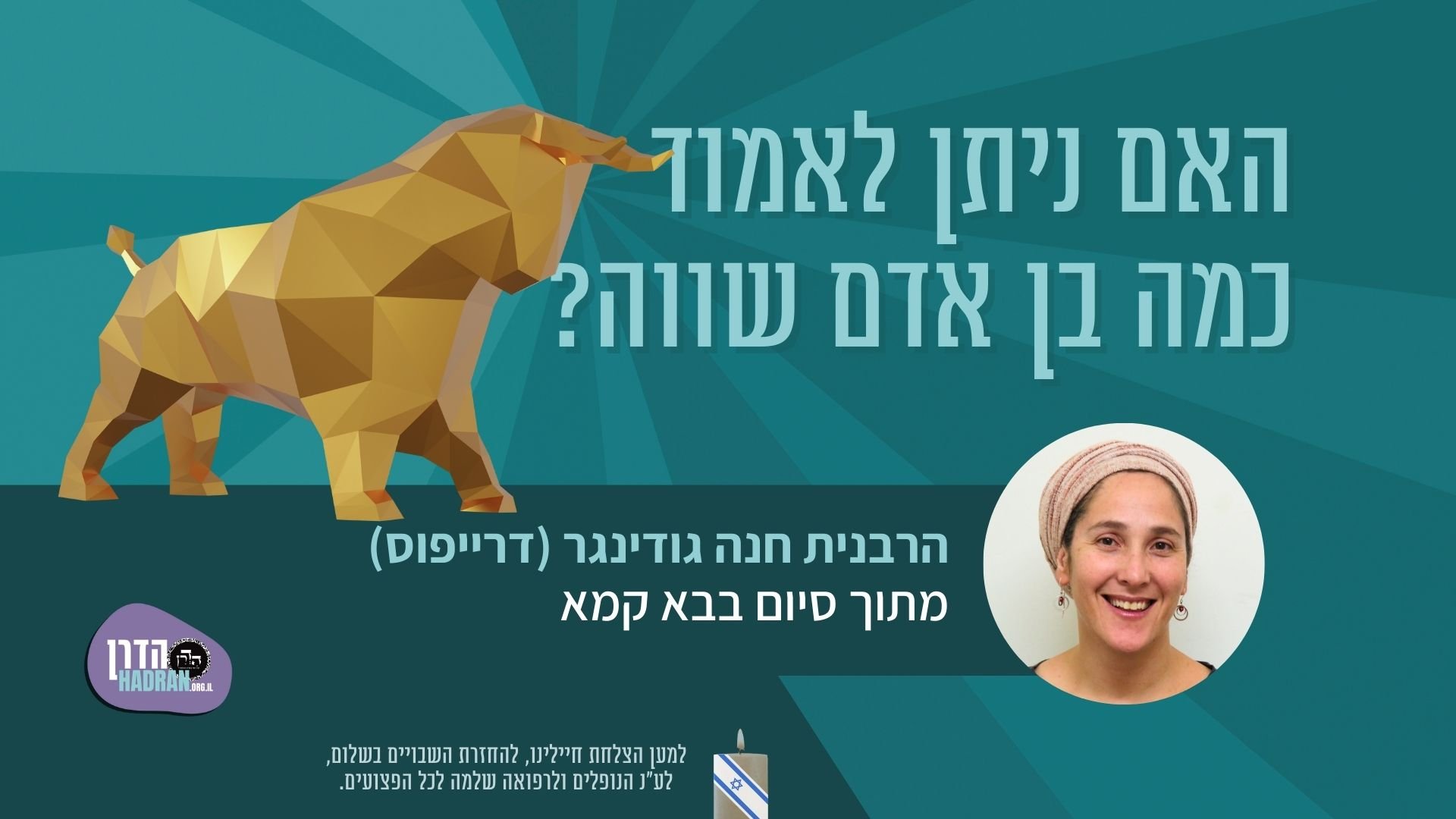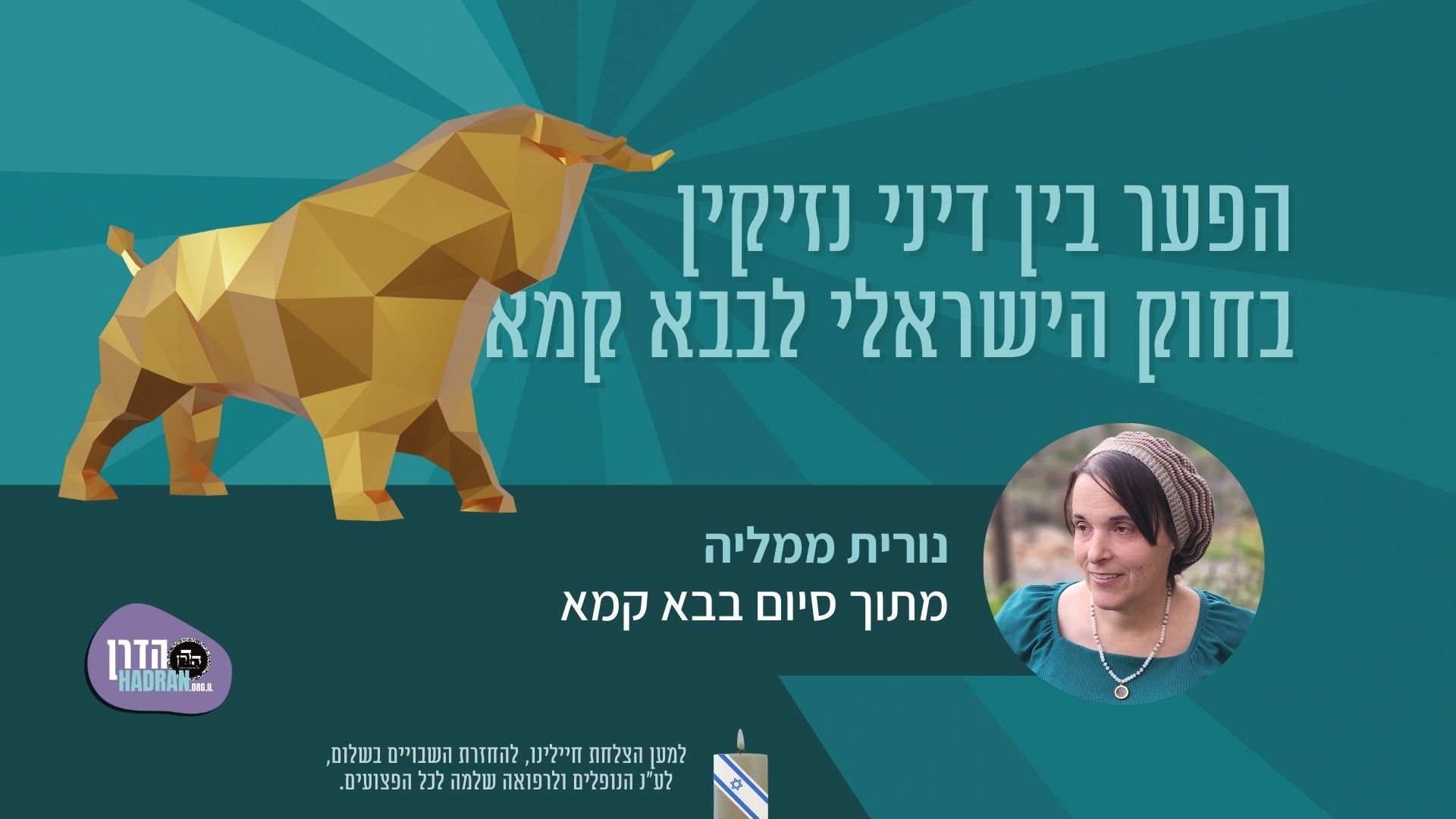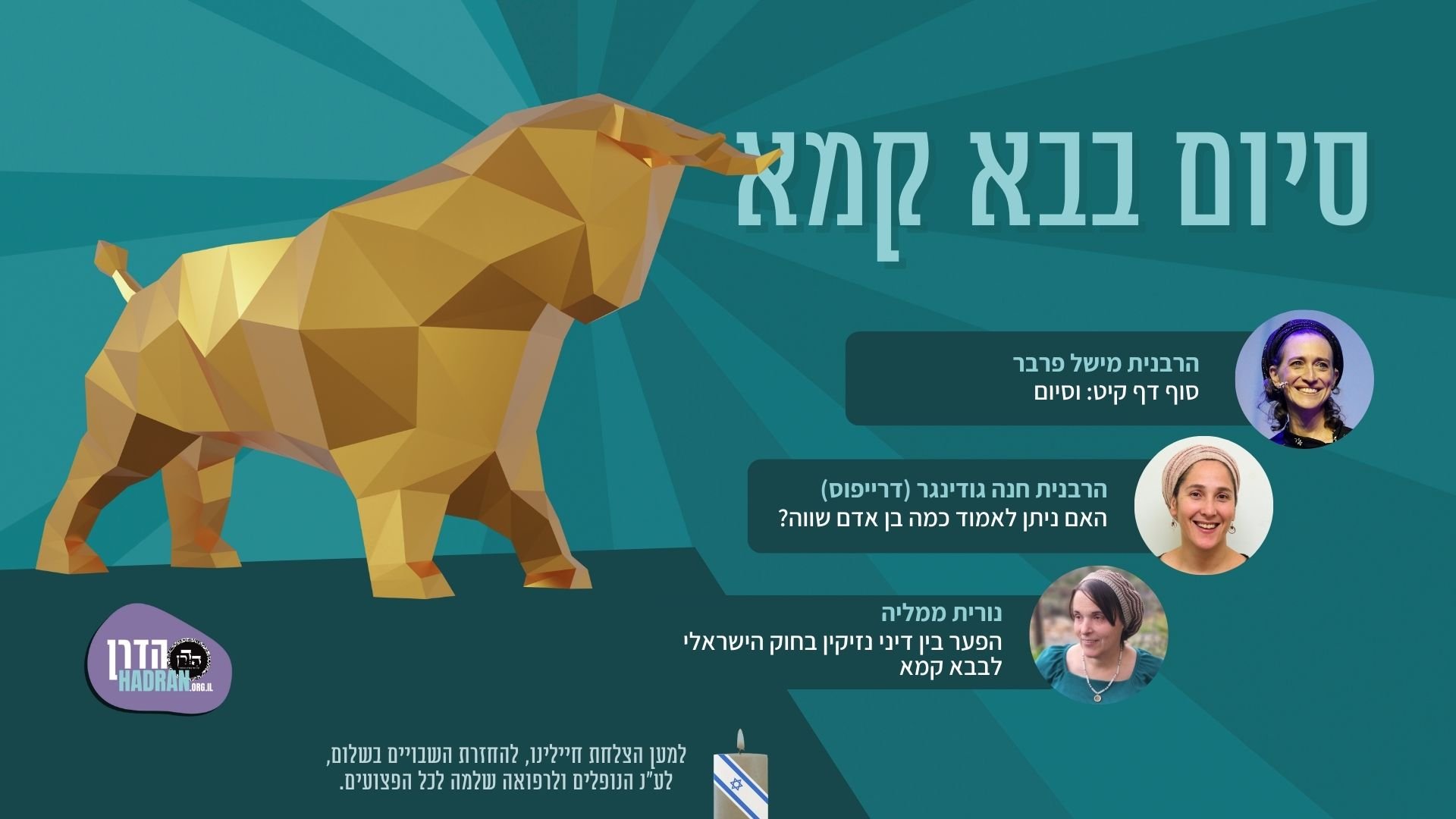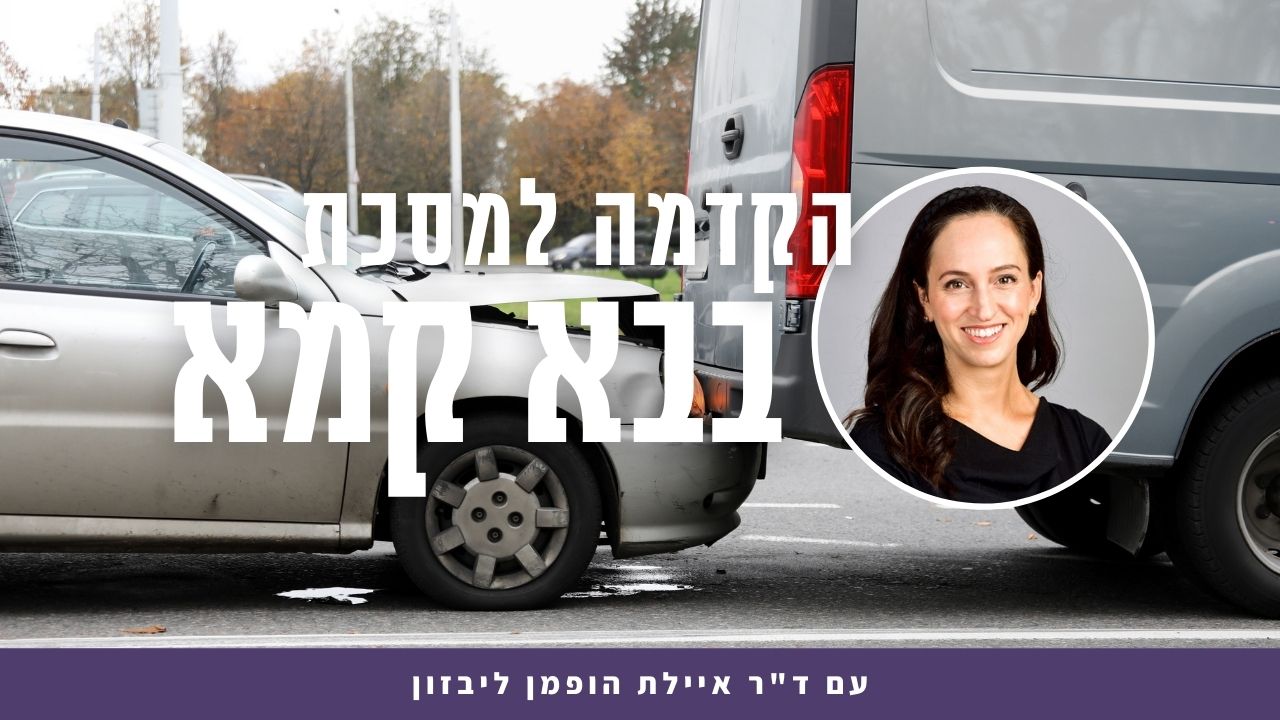בבא קמא קטז
תִּשָּׁפֵךְ הַכֹּל, וּבֵית הִלֵּל אוֹמְרִים: תֵּעָשֶׂה זִילּוּף. אָמַר רַבִּי יִשְׁמָעֵאל בְּרַבִּי יוֹסֵי: אֲנִי אַכְרִיעַ; בַּבַּיִת – תֵּעָשֶׂה זִילּוּף, וּבַשָּׂדֶה – תִּשָּׁפֵךְ הַכֹּל.
The wine must all be poured out in order to prevent a possible mishap. And Beit Hillel say: Let the wine be used for sprinkling. Rabbi Yishmael, son of Rabbi Yosei, said: I will decide the halakha by proposing an intermediate opinion: If the wine became impure in a house, it may be used for sprinkling, as it can be used immediately, but if it became impure in the field, it must all be poured out, as it is possible that by the time it is brought to the house and used for sprinkling, someone may drink it.
אִיכָּא דְּאָמְרִי: בְּיָשָׁן – תֵּעָשֶׂה זִילּוּף, וּבְחָדָשׁ – תִּשָּׁפֵךְ הַכֹּל. אָמְרוּ לוֹ: אֵין הַכְרָעָה שְׁלִישִׁית מַכְרַעַת.
There are those who say that he decided the halakha as follows: With regard to aged wine, it may be used for sprinkling, as it is fit to be sprinkled immediately, but with regard to new wine, which does not yet have a pleasant aroma, it must all be poured out in order to prevent a possible mishap. They said to Rabbi Yishmael, son of Rabbi Yosei: A decision by a third party does not conclusively decide the halakha.
אִם אָמַר לוֹ: ״אַצִּיל אֶת שֶׁלְּךָ וְכוּ׳״. אַמַּאי? וְנֵימָא לֵיהּ: ״מְשַׁטֶּה אֲנִי בָּךְ״!
§ The mishna teaches that if the owner of the wine said to the owner of the honey: I will salvage your honey and you will pay me the value of my wine, the owner of the honey is obligated to give him compensation for the wine. The Gemara asks: Why is the stipulation binding? Let the owner of the honey say to him: I was merely fooling with you when I accepted your condition, and I did not agree to it at all.
מִי לָא תַּנְיָא: הֲרֵי שֶׁהָיָה בּוֹרֵחַ מִבֵּית הָאֲסוּרִין וְהָיְתָה מַעְבּוֹרֶת לְפָנָיו, אָמַר לוֹ: ״טוֹל דִּינָר, וְהַעֲבִירֵנִי״ – אֵין לוֹ אֶלָּא שְׂכָרוֹ. אַלְמָא אָמַר לֵיהּ: ״מְשַׁטֶּה אֲנִי בָּךְ״; הָכָא נָמֵי, לֵימָא לֵיהּ: ״מְשַׁטֶּה אֲנִי בָּךְ״!
Isn’t it taught in a baraita: In a case where one was fleeing from prison and there was a ferry before him, and he said to the ferryman: Take this entire dinar and take me across the river, the ferryman has the right to collect only his usual wage, but not the entire dinar. Apparently, the prisoner could have said to him: I was merely fooling with you and never intended to pay you a full dinar. Here also, let the owner of the honey say to the owner of the wine: I was merely fooling with you.
הָא לָא דָּמֵי אֶלָּא לְסֵיפָא – וְאִם אָמַר לוֹ: ״טוֹל דִּינָר זֶה בִּשְׂכָרְךָ, וְהַעֲבִירֵנִי״ – נוֹתֵן לוֹ שְׂכָרוֹ מִשָּׁלֵם.
The Gemara answers: This case in the mishna is not comparable to the case cited above; rather, it is comparable to the latter clause of that same baraita, which states: And if he said to the ferryman: Take this dinar as your wage and take me across the river, the prisoner must give him his wage in the full amount, i.e., the entire dinar.
מַאי שְׁנָא רֵישָׁא וּמַאי שְׁנָא סֵיפָא? אָמַר רָמֵי בַּר חָמָא: בְּצַיָּיד הַשּׁוֹלֶה דָּגִים מִן הַיָּם, וְאָמַר לֵיהּ: אַפְסֵדְתַּנִי כְּווֹרֵי בְּזוּזָא.
What is different in the first clause, which states that the ferryman receives only his regular wage, and what is different in the latter clause, which states that he receives the full dinar? Rami bar Ḥama said: The latter clause deals with a trapper who scoops fish from the sea, i.e., a fisherman, and he can say to the prisoner: You have caused me a loss of fish [kavrei] worth a dinar, which I would have caught had I not taken you across the river. Similarly, in the case in the mishna, the owner of the wine sustains a financial loss in order to save the honey, and therefore he is entitled to the compensation that the owner of the honey agreed to pay.
שָׁטַף נָהָר חֲמוֹרוֹ וַחֲמוֹר חֲבֵירוֹ, שֶׁלּוֹ יָפֶה מָנֶה וְכוּ׳. וּצְרִיכָא; דְּאִי אַשְׁמְעִינַן קַמַּיְיתָא, הָתָם הוּא דְּכִי פֵּירֵשׁ יָהֵיב לֵיהּ דְּמֵי כּוּלֵּיהּ, מִשּׁוּם דִּבְיָדַיִם קָא פָסֵיד; אֲבָל הָכָא דְּמִמֵּילָא, נֵימָא: אֵין לוֹ אֶלָּא שְׂכָרוֹ.
§ The mishna teaches: If a river washed away his donkey and the donkey of the other man, and his donkey is worth one hundred dinars, etc. The Gemara notes: And it is necessary to teach both the case of the barrels of wine and honey and the case of the donkeys, as if it had taught us only the first case, that of the wine and honey, it might be said that it is only there, in that case, that when the owner of the wine states his stipulation, the owner of the honey gives him the value of the entire loss. Why is this? It is because the wine is lost through the direct action of its owner. But here, in the case of the donkeys, since the donkey is lost by itself in the river, let us say: The one who salvages the donkey of his fellow has the right to only his wage, i.e., compensation for his labor.
וְאִי אַשְׁמְעִינַן סֵיפָא, הָכָא הוּא דְּבִסְתָמָא אֵין לוֹ אֶלָּא שְׂכָרוֹ, מִשּׁוּם דְּמִמֵּילָא; אֲבָל הָתָם, דִּבְיָדַיִם, אֵימָא אֲפִילּוּ בִּסְתָמָא יָהֵיב לֵיהּ דְּמֵי כּוּלֵּהּ; צְרִיכָא.
And if the mishna had taught us only the case of the latter clause, it might be said: It is here, in the case of the donkeys, that if the intention of the one who saved the donkey was unspecified, i.e., he did not stipulate that the owner of the other donkey would compensate him for the loss of his own donkey, he has the right to only his wage, because the donkey is lost by itself. But there, where the barrel of wine is lost through the direct action of its owner, one might say: Even in a case where the intention of the owner of the wine was unspecified, the owner of the honey must give him the value of the entire barrel of wine. The Gemara concludes: Indeed, both cases are necessary.
בְּעָא מִינֵּיהּ רַב כָּהֲנָא מֵרַב: יָרַד לְהַצִּיל, וְעָלָה שֶׁלּוֹ מֵאֵלָיו, מַהוּ? אֲמַר לֵיהּ: מִשְּׁמַיָּא רְחִימוּ עֲלֵיהּ.
The Gemara cites a relevant discussion. Rav Kahana raised a dilemma before Rav: If one descended into the river to rescue another’s donkey instead of his own after stipulating that he would be compensated for the loss of his own donkey, and his own donkey emerged from the river by itself, what is the halakha? Is the rescuer still entitled to payment from the owner of the donkey that he saved, despite the fact that he did not suffer a monetary loss? Rav said to him: The rescuer is still compensated because it was from Heaven that mercy was bestowed upon him, and his good fortune does not affect the stipulation.
כִּי הָא דְּרַב סָפְרָא הֲוָה קָא אָזֵיל בִּשְׁיָירְתָּא, לַוִּינְהוּ הָהוּא אֲרִי. כֹּל לֵילְיָא קָא (שַׁדַּר) [שָׁדוּ] לֵיהּ חֲמָרָא דְּחַד מִינַּיְיהוּ, וְקָא אָכֵיל. כִּי מְטָא זִמְנֵיהּ דְּרַב סָפְרָא, (שַׁדַּר) [שְׁדָא] לֵיהּ חֲמָרֵאּ וְלָא אַכְלֵיהּ. קְדֵים רַב סָפְרָא וּזְכָה בֵּיהּ.
This is like that case where Rav Safra was traveling in a caravan, and a certain lion followed them, accompanying them along the way. Every night, the travelers would send one of their donkeys to the lion, and the lion would eat it. When Rav Safra’s time arrived to provide the lion with prey, he sent it his donkey but the lion did not eat it. Rav Safra went ahead and acquired it back, as his donkey had become ownerless when he presented it to the lion. Although Rav Safra did not lose his donkey, he had fulfilled his obligation to provide the lion with a donkey, and his good fortune did not affect his obligation vis-à-vis the other travelers.
אֲמַר לֵיהּ רַב אַחָא מִדִּיפְתִּי לְרָבִינָא: לְמָה לֵיהּ לְמִיזְכֵּי בֵּיהּ? נְהִי דְּכִי אַפְקְרֵיהּ – אַדַּעְתָּא דְאַרְיָה אַפְקְרֵיהּ, אַדַּעְתָּא דְּכוּלֵּי עָלְמָא לָא אַפְקְרֵיהּ! אֲמַר לֵיהּ: רַב סָפְרָא לְרַוְוחָא דְמִילְּתָא הוּא דַּעֲבַד.
With regard to this episode, Rav Aḥa of Difti said to Ravina: Why was it necessary for him to acquire the donkey again? Although Rav Safra made it ownerless by sending it to the lion, it was made ownerless only with the intention that the lion would consume it, but it was not made ownerless with the intention that everyone else could acquire it. Accordingly, no one else could have acquired the donkey. Ravina said to him: Rav Safra did so as an added precaution.
בְּעָא מִינֵּיהּ רַב מֵרַבִּי: יָרַד לְהַצִּיל וְלֹא הִצִּיל, מַהוּ? אָמַר לוֹ: וְזוֹ שְׁאֵילָה, אֵין לוֹ אֶלָּא שְׂכָרוֹ.
Rav raised a dilemma before Rabbi Yehuda HaNasi: If one descended into the river in order to rescue another’s donkey instead of his own, but he did not manage to rescue it, what is the halakha? Does the stipulation still apply so that the owner of the donkey he attempted to rescue must compensate him for the loss of his own donkey? Rabbi Yehuda HaNasi said to him: And is this a question? It is clear that he has the right to collect only his wage, but he is not entitled to the value of his own donkey.
אֵיתִיבֵיהּ: הַשּׂוֹכֵר אֶת הַפּוֹעֵל
Rav raised an objection to Rabbi Yehuda HaNasi’s ruling from a baraita: In a case of one who hires a laborer
לְהָבִיא כְּרוּב וְדוּרְמַסְקָנִין לַחוֹלֶה, וְהָלַךְ וּמְצָאוֹ שֶׁמֵּת אוֹ שֶׁהִבְרִיא – נוֹתֵן לוֹ שְׂכָרוֹ מִשָּׁלֵם!
to bring cabbage and plums to an ill person, and he went and found that the patient had already died or recovered, the employer nevertheless gives the worker his entire wage. Evidently, one is paid for his efforts even if the desired result is not accomplished. Accordingly, the rescuer’s stipulation should apply, and one should be obligated to pay another for attempting to salvage his donkey even if he did not actually succeed in doing so.
אֲמַר לֵיהּ: מִי דָּמֵי?! הָתָם עָבֵיד שָׁלִיחַ שְׁלִיחוּתֵיהּ, הָכָא לָא עָבֵיד שָׁלִיחַ שְׁלִיחוּתֵיהּ.
Rabbi Yehuda HaNasi said to him: Are those two cases comparable? There, in the case of the ill person, the agent performed his assignment, as he procured and delivered the foods to the ill person, but here, in the case of the donkeys, the agent did not perform his assignment, as he was unable to rescue the animal from the river.
תָּנוּ רַבָּנַן: שְׁיָירָא שֶׁהָיְתָה מְהַלֶּכֶת בַּמִּדְבָּר, וְעָמַד עָלֶיהָ גַּיִיס לְטוֹרְפָהּ – מְחַשְּׁבִין לְפִי מָמוֹן, וְאֵין מְחַשְּׁבִין לְפִי נְפָשׁוֹת.
§ Apropos the episode involving Rav Safra, the Gemara discusses the division of expenses among travelers in a caravan. The Sages taught in a baraita: In the case of a caravan that was traveling in the desert and a troop of bandits stood over it in order to attack and pillage it, and the members of the caravan agreed to pay ransom to the bandits, they calculate each traveler’s contribution according to the amount of money he is carrying, and they do not calculate according to the number of souls in the caravan, i.e., the expense is not divided equally among the travelers.
וְאִם שָׂכְרוּ תַּיָּיר הַהוֹלֵךְ לִפְנֵיהֶם – מְחַשְּׁבִין אַף לְפִי נְפָשׁוֹת; וְלֹא יְשַׁנּוּ מִמִּנְהַג הַחַמָּרִין.
But if they hired a scout who travels in front of them and leads them safely through the desert, the travelers calculate each one’s contribution to paying the scout’s wages even according to the number of souls. And they should not differ from the usual custom of donkey drivers, who often have set procedures for such situations.
רַשָּׁאִין הַחַמָּרִין לְהַתְנוֹת שֶׁכׇּל מִי שֶׁיֹּאבַד לוֹ חֲמוֹרוֹ נַעֲמִיד לוֹ חֲמוֹר אַחֵר. בְּכוּסְיָא – אֵין מַעֲמִידִין, שֶׁלֹּא בְּכוּסְיָא – מַעֲמִידִין לוֹ. וְאִם אָמַר: ״תְּנוּ לִי, וַאֲנִי אֶשְׁמוֹר״ – אֵין שׁוֹמְעִין לוֹ.
The donkey drivers are permitted to stipulate that with regard to anyone whose donkey becomes lost, the caravan will provide him with a different donkey. If the donkey was lost through negligence, they do not provide him with another donkey, but if it was lost not through negligence, they provide him with another donkey. And if the individual whose donkey became lost said: Give me money instead of the donkey and I will guard the caravan along with everyone else, they do not listen to him.
פְּשִׁיטָא! לָא צְרִיכָא, דְּאִית לֵיהּ חֲמָרָא אַחֲרִינָא. מַהוּ דְּתֵימָא: הָא קָא מְינַטַּר לֵיהּ; קָא מַשְׁמַע לַן – שָׁאנֵי נְטִירוּתָא דְחַד מִנְּטִירוּתָא דְבֵי תְרֵי.
The Gemara asks: Isn’t this obvious? No, it is necessary to teach this for a case where he already has another donkey, lest you say that he will guard the caravan for its sake. Since he still owns one donkey, he never lost his incentive to guard the caravan, and the other drivers should therefore give him money if he wishes. The baraita therefore teaches us that guarding one donkey is different from guarding two donkeys, and the driver will be more likely to guard the caravan properly if they supply him with another donkey.
תָּנוּ רַבָּנַן: סְפִינָה שֶׁהָיְתָה מְהַלֶּכֶת בַּיָּם; עָמַד עָלֶיהָ נַחְשׁוֹל לְטוֹבְעָהּ, וְהֵקֵילּוּ מִמַּשָּׂאָהּ – מְחַשְּׁבִין לְפִי מַשּׂאוֹי, וְאֵין מְחַשְּׁבִין לְפִי מָמוֹן; וְלֹא יְשַׁנּוּ מִמִּנְהַג הַסַּפָּנִים.
§ The Gemara cites another baraita that discusses the division of expenses among a group. The Sages taught: In a case of a boat that was traveling on the sea when a gale arose and threatened to sink it, and the sailors lightened its load by throwing some of their belongings overboard, the sailors calculate the amount that each must throw out according to weight, but they do not calculate it according to how much money the items are worth. And they should not differ from the usual custom of sailors.
וְרַשָּׁאִין הַסַּפָּנִים לְהַתְנוֹת, שֶׁכׇּל מִי שֶׁאָבְדָה לוֹ סְפִינָה נַעֲמִיד לוֹ סְפִינָה אַחֶרֶת. אָבְדָה לוֹ בְּכוּסְיָא – אֵין מַעֲמִידִין, שֶׁלֹּא בְּכוּסְיָא – מַעֲמִידִין לוֹ. וְאִי פֵּירַשׁ לְמָקוֹם שֶׁאֵין הַסְּפִינוֹת הוֹלְכִין – אֵין מַעֲמִידִין.
And if a number of boats are traveling together, the sailors are permitted to stipulate that with regard to anyone whose boat was lost, the others will provide him with a different boat. If his boat was lost through negligence, the other sailors do not provide him with another boat, but if it was lost not through negligence, the sailors provide him with another boat. And if the boat sailed to a place where the boats do not travel, the other sailors do not provide him with a different boat.
פְּשִׁיטָא! לָא צְרִיכָא, דִּבְנִיסָן מְרַחֲקִי חַד אַשְׁלָא, וּבְתִשְׁרִי מְרַחֲקִי תְּרֵי אַשְׁלֵי, וְקָא אָזֵיל בְּיוֹמֵי נִיסָן לִמְקוֹם תִּשְׁרֵי; מַהוּ דְּתֵימָא: דַּוְושֵׁיהּ נָקֵיט וְאָזֵיל, קָא מַשְׁמַע לַן.
The Gemara asks: Isn’t this obvious? The Gemara answers: No, it is necessary because in the month of Nisan, the boats distance themselves from the shore by one rope length, and in the month of Tishrei, they distance themselves by two rope lengths. And in this case, the boat was traveling during Nisan and sailed to the place where boats sail during Tishrei. Lest you say that the sailor is not considered negligent because he is taking his usual route and traveling as he is accustomed to, the baraita teaches us that his actions are considered negligent.
תָּנוּ רַבָּנַן: שְׁיָירָא שֶׁהָיְתָה מְהַלֶּכֶת בַּמִּדְבָּר וְעָמַד גַּיִיס וּטְרָפָהּ, וְעָמַד אֶחָד מֵהֶן וְהִצִּיל – הִצִּיל לָאֶמְצַע. וְאִם אָמַר: ״אֲנִי אַצִּיל לְעַצְמִי״ – הִצִּיל לְעַצְמוֹ.
The Sages taught in a baraita: In a case of a caravan that was traveling in the desert and a troop of bandits stood over it and pillaged it, and one of the travelers arose and rescued the caravan from the bandits, he has rescued the property for the common good, i.e., each member of the caravan receives back his property. And if he stated: I will rescue the property from the bandits for myself, then he has effectively rescued the items for himself, and he is now the legal owner of all the property.
הֵיכִי דָמֵי? אִי דְּיָכוֹל לְהַצִּיל, אֲפִילּוּ סֵיפָא נָמֵי לָאֶמְצַע! וְאִי דְּלֹא יָכוֹל לְהַצִּיל, אֲפִילּוּ רֵישָׁא נָמֵי לְעַצְמוֹ!
The Gemara asks: What are the circumstances of the case? If each member of the caravan is able to rescue his property, then even in the latter clause, where the rescuer states that he is saving the property for himself, the halakha should also be that the possessions are rescued for the common good, as the other members of the caravan did not despair of retrieving their property. And if each member of the caravan is unable to rescue his property, they despair of retrieving their property and relinquish ownership of it. Consequently, even in the first clause, the halakha should also be that the possessions are saved for himself, so that he is their legal owner. Why is there a discrepancy between the halakha in the first clause and the halakha in the latter clause?
אָמַר רָמֵי בַּר חָמָא: הָכָא בְּשׁוּתָּפִין עָסְקִינַן, וּכְגוֹן זֶה – שׁוּתָּף חוֹלֵק שֶׁלֹּא לְדַעַת חֲבֵירוֹ; אֲמַר – פָּלֵיג, לָא אֲמַר – לָא פָּלֵיג.
The Gemara answers: Rami bar Ḥama said: Here, in the case of the baraita, we are dealing with a caravan whose members are partners and jointly own the confiscated property, and in a case such as this, a partner may divide the property without the other partner’s consent. Therefore, if he said that he intends to save the property for himself, he has dissolved the partnership and divided the property so that if he is able to rescue only some of the property, the property he rescues is his share of the joint property. If he did not say that he intends to save the property for himself, he has not divided the property, and whatever he rescues is jointly owned by the partners.
רָבָא אָמַר: הָכָא בְּפוֹעֲלִין עָסְקִינַן, וּכְרַב – דְּאָמַר רַב: פּוֹעֵל יָכוֹל לַחֲזוֹר בּוֹ אֲפִילּוּ בַּחֲצִי הַיּוֹם.
Rava stated a different answer: Here, in the baraita, we are dealing with laborers who were hired to protect the caravan, and one of these guards saved the travelers’ property. And it is in accordance with the opinion of Rav, as Rav says: A laborer may retract his commitment to his employer even in the middle of the day.
וְכַמָּה דְּלָא הֲדַר בֵּיהּ – כְּבִרְשׁוּתֵיהּ דְּבַעַל הַבַּיִת דָּמֵי, וְכִי הָדַר בֵּיהּ – טַעְמָא אַחֲרִינָא הוּא, דִּכְתִיב: ״כִּי לִי בְנֵי יִשְׂרָאֵל עֲבָדִים״ – וְלֹא עֲבָדִים לַעֲבָדִים.
The Gemara explains: As long as he did not retract his commitment, he is considered to be under the jurisdiction of the employer, so that anything he saves automatically belongs to the employer. And when he retracts his commitment, it is for a different reason that he is able to do so, as it is written: “For unto Me the children of Israel are servants” (Leviticus 25:55), indicating that Jews are servants of God, but not servants of servants, i.e., of other Jews. Consequently, it is permitted for a laborer to conclude his term of employment whenever he wants. Once he does so, if he saves property that the members of the caravan are unable to rescue, the property belongs to him.
רַב אָשֵׁי אָמַר: כְּשֶׁיָּכוֹל לְהַצִּיל עַל יְדֵי הַדְּחָק. גַּלִּי דַּעְתֵּיהּ – לְעַצְמוֹ, לָא גַּלִּי דַּעְתֵּיהּ – לָאֶמְצַע.
Rav Ashi stated another answer: The baraita is discussing a case where the other members of the caravan are able to rescue the property with difficulty. Therefore, if he revealed his intention to rescue the property for himself and the other travelers did not protest, it is clear that they have despaired of recovering their property, and the rescuer has secured the property for himself. If he did not reveal his intention to rescue the property for himself, the status quo remains and the property has been rescued for the common good.
מַתְנִי׳ הַגּוֹזֵל שָׂדֶה מֵחֲבֵירוֹ וּנְטָלוּהָ מַסִּיקִין, אִם מַכַּת מְדִינָה הִיא – אוֹמֵר לוֹ: ״הֲרֵי שֶׁלְּךָ לְפָנֶיךָ״; אִם מֵחֲמַת הַגַּזְלָן – חַיָּיב לְהַעֲמִיד לוֹ שָׂדֶה אַחֵר.
MISHNA: In a case of one who robs a field from another and thugs [massikin] subsequently take the field from the robber, the halakha is dependent upon the circumstances: If it is a regional disaster in which the thugs seize all the property in the region, the robber says to the owner of the field: That which is yours is before you, i.e., it is your prerogative to try to reclaim it from the thugs. No compensation is required since the thugs would have seized the property in any event. But if the thugs took that field alone due to the robber, the robber is obligated to provide the owner with a different field.
גְּמָ׳ אָמַר רַב נַחְמָן בַּר יִצְחָק: מַאן דְּתָנֵי ״מַסִּיקִין״ – לָא מִשְׁתַּבַּשׁ, וּמַאן דְּתָנֵי ״מַצִּיקִין״ – לָא מִשְׁתַּבַּשׁ. מַאן דְּתָנֵי ״מַצִּיקִין״ לָא מִשְׁתַּבַּשׁ, דִּכְתִיב: ״בְּמָצוֹר וּבְמָצוֹק״.
GEMARA: Rav Naḥman bar Yitzḥak said: One who teaches the mishna using the term massikin does not err, and one who teaches the mishna using the term matzikin also does not err, as both terms may be used to refer to thugs. One who teaches the mishna using the term matzikin does not err, as it is written: “In the siege and in the distress [matzok] with which your enemies shall distress you” (Deuteronomy 28:55). Consequently, matzikin are individuals who cause distress to others.
וּמַאן דְּתָנֵי ״מַסִּיקִין״ לָא מִשְׁתַּבַּשׁ, דִּכְתִיב: ״יְיָרֵשׁ הַצְּלָצַל״ – וּמְתַרְגְּמִינַן: יַחְסְנִינֵּיהּ סַקָּאָה.
And one who teaches the mishna using the term massikin does not err, as it is written: “All your trees and the fruit of your land shall the locust consume” (Deuteronomy 28:42), and, in the standard Aramaic translation, we translate this phrase as: Shall the locust [sakke’a] consume. Consequently, massikin are those who consume the property of others.
אִם מֵחֲמַת הַגַּזְלָן – חַיָּיב. הֵיכִי דָמֵי? אִילֵּימָא דְּאַנְסוּהָ לְאַרְעָא דִידֵיהּ וְלָא אֲנַסוּה כּוּלֵּי אַרְעָתָא, הָא מֵרֵישָׁא שָׁמְעַתְּ מִינַּהּ: אִם מַכַּת מְדִינָה הִיא כּוּ׳, אִי לָא – לָא!
§ The mishna teaches: If the thugs took the field due to the robber, the robber is obligated to provide the owner with a different field. The Gemara asks: What are the circumstances of the case in the latter clause of the mishna? If we say that they seized only his land, i.e., the robber’s land, and did not seize all the other lands in the region, you already learned this from the first clause of the mishna: If it is a regional disaster in which the thugs seize all the property in the region, the robber is not obligated to compensate the owner of the field, which indicates that if it is not a regional disaster, the robber is not exempt from payment. What novelty does the latter clause teach?
לָא צְרִיכָא, דְּאַחְוַי אַחְווֹיֵי. לִישָּׁנָא אַחֲרִינָא: הָכָא בְּמַאי עָסְקִינַן – כְּגוֹן דְּאַנְסוּהּ גּוֹיִים, (וְאָמְרִי) [וְאַחְוִי] לֵיהּ אַחְוֹיֵי אַרְעָתֵיהּ, וְאַחְוִי הָהִוא בַּהֲדַיְיהוּ.
The Gemara explains: No, it is necessary for a case where the individual did not actually take control of the property before it was seized by the thugs, but rather showed the field to the thugs and thereby facilitated their occupation of the field. A different version of this answer is as follows: With what are we dealing here? A case where gentiles coerced someone and told him to show them his land for them to seize, and he showed them that field belonging to another, along with his own fields, and the thugs then seized all the land he showed them.
הָהוּא גַּבְרָא דְּאַחְוִי אַכַּרְיָא דְחִטֵּי דְּבֵי רֵישׁ גָּלוּתָא. אֲתָא לְקַמֵּיהּ דְּרַב נַחְמָן, חַיְּיבֵיהּ רַב נַחְמָן לְשַׁלּוֹמֵי. יָתֵיב רַב יוֹסֵף אֲחוֹרֵיהּ דְּרַב הוּנָא בַּר חִיָּיא, וְיָתֵיב רַב הוּנָא בַּר חִיָּיא קַמֵּיהּ דְּרַב נַחְמָן, אֲמַר לֵיהּ רַב הוּנָא בַּר חִיָּיא לְרַב נַחְמָן: דִּינָא אוֹ קְנָסָא?
The Gemara recounts a related incident: There was a certain man who showed piles of wheat, belonging to the Exilarch’s household, to thugs, who seized them. The case came before Rav Naḥman for judgment, and Rav Naḥman deemed that man liable to pay the Exilarch for the stolen wheat. Rav Yosef was sitting behind Rav Huna bar Ḥiyya, and Rav Huna bar Ḥiyya was sitting before Rav Naḥman. Rav Huna bar Ḥiyya said to Rav Naḥman: Did you deem him liable to pay because that is the halakha, or was it a fine?
אֲמַר לֵיהּ: מַתְנִיתִין הִיא, דִּתְנַן: אִם מֵחֲמַת הַגַּזְלָן – חַיָּיב לְהַעֲמִיד לוֹ שָׂדֶה; וְאוֹקִימְנָא דְּאַחְוִי אַחְווֹיֵי. בָּתַר דִּנְפַק, אֲמַר לֵיהּ רַב יוֹסֵף לְרַב הוּנָא בַּר חִיָּיא: מַאי נָפְקָא לָךְ מִינֵּיהּ
Rav Naḥman said to him: This individual’s liability is written explicitly in the mishna, i.e., it is the halakha, as we learned in the mishna: If thugs took the field due to the robber, he is obligated to provide the owner with a different field. And it was established that the mishna is referring to a case where an individual showed the field to thugs, who later seized it. So too, in this case, the one who showed the Exilarch’s wheat pile to the thugs is obligated to pay for them. After Rav Naḥman left, Rav Yosef said to Rav Huna bar Ḥiyya: What difference does it make to you

































